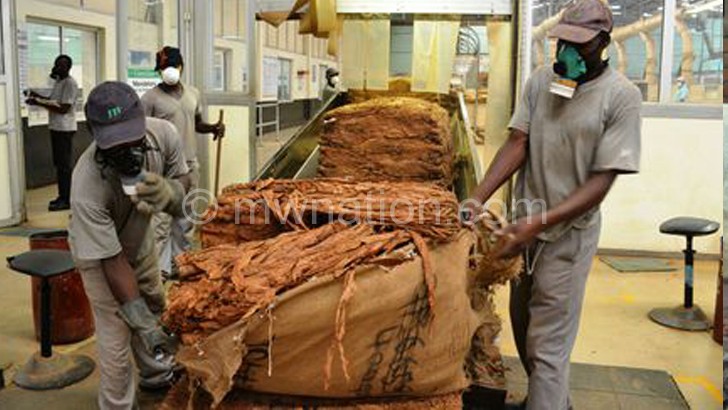Tobacco processors reaffirm ips support
Tobacco Processors Association (TPA) have thrown their weight behind the integrated production system (IPS) of tobacco, saying it gives buyers audited proof that tobacco in the country is grown in a sustainable and compliant manner.
In a statement issued ahead of a key tobacco meeting today in Lilongwe, TPA reaffirmed its support for IPS growers and pledged to proactively provide clear information on IPS to assist relevant parties and the public in understanding the system.
TPA is a body of local buying and tobacco processing companies comprising Alliance One Tobacco (Malawi) Limited, Limbe Leaf Tobacco Company Limited, Japan Tobacco International (JTI) Leaf Malawi Limited and Premium Tama Tobacco Limited.

“We would like to confirm [our] support for tobacco production in Malawi. Tobacco grown under the IPS system provides our customers with the required audited proof that it is grown in a sustainable, compliant manner. It is a demand driven system with over 50 percent of our customer base requiring this for their purchases,” TPA statement reads in part.
The tobacco processors said for Malawi to remain sustainable and competitive, it is essential that they provide customers assurance that tobacco purchased from Malawi is grown and processed in line with required acceptable standards of the countries where the Malawi tobacco buyers sell their products.
“The IPS system allows buyer and grower to work together from seed to market to produce a sustainable, traceable and compliant crop to meet the demands of the international market. All major tobacco producing countries such as Brazil, Mozambique and Zimbabwe have adopted a form of IPS,”
The firms said the system also offers Malawi the opportunity for the much-needed crop diversification the country seeks to achieve, by providing for integrated production of tobacco with food crops, forestation, irrigation farming and best practice in labuor and environment.
“Since its adoption in 2012, more growers are voluntarily opting for contract arrangements as opposed to auction. The interest, therefore, assures us that IPS has support from growers,” reads the statement.
Statistics from Tobacco Control Commission (TCC) indicate that the number of IPS registered farmers is increasing from 69 percent in 2013 to 74 percent in 2014 and 82 percent in 2015.
In response to international customer requirements, IPS received government approval in 2012 allowing the buyer to contract with the grower to buy an agreed volume of tobacco at a price not less than government minimum prices (GMP).
TPA said the industry, therefore, operates under the government approved IPS regulations—Government Notice No 14 of January 17 2014—which also provides for minimum terms of contracts.
TPA says since the advent of the IPS system there has been improvement in a number of areas in the tobacco value chain, including improved yield per hectare creating land space for other cash crops and forestry, improved yield accompanied by improved quality.
On Friday, JTI Leaf Malawi managing director, Fries Vanneste told the media in Lilongwe that apart from improving growers food security at household level, IPS has also improved market efficiencies due to a committed buyer and grower arrangement.
TPA said there are also fewer rejections attributable to non-conformity with both buyer and grower having the option to negotiate on quality variance.
Earlier this year, Farmers Union of Malawi (FUM) faulted the system over alledged lack of transparency especially when it comes to loan packages.
However, Minister of Agriculture, Irrigation and Water Development Allan Chiyembekeza has backed the system, saying it has improved the tobacco industry.
But TPA says stakeholders with concerns on how the IPS is being implemented in Malawi for open, constructive and transparent dialogue while seeking for areas of improvement.
Tobacco is Malawi’s main cash crop, contributing 60 percent to the country’s foreign exchange earnings.
This year tobacco sold on the auction system raked in $337 million (about K200 billion) in foreign earnings. n





